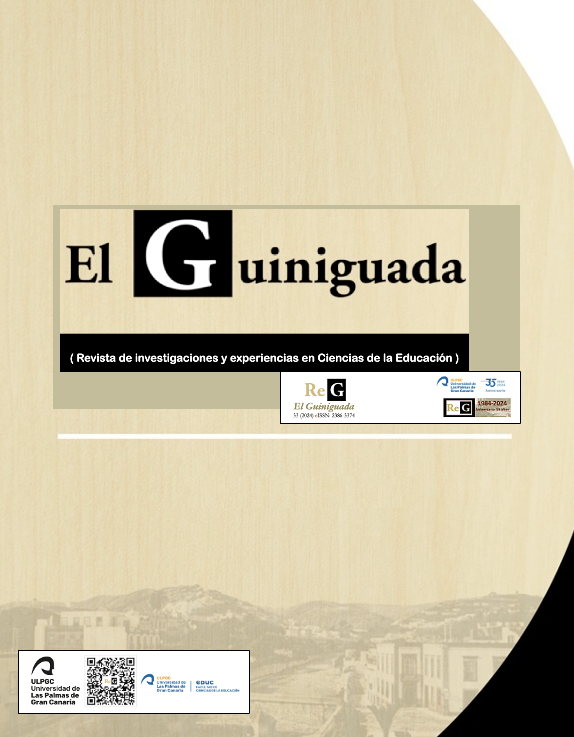Attitude and assertiveness in the classroom in the use of spoken Catalan
10.20420/ElGuiniguada.2024.727
Keywords:
language attitude, assertiveness, Primary Education, Catalan, Teaching practice in schoolsAbstract
This research analyses attitude and assertiveness in the use of spoken Catalan in the classroom by 44 Primary Education undergraduates from the University of Barcelona and the Rovira i Virgili University during their teaching practice in 34 schools during the academic year 2021–2022. Quantitative and qualitative data were compared to determine the results of training in language assertiveness during the teaching practice, using an observation questionnaire completed twice by the school tutors before (Q1) and after the training (Q2). Quantitatively, there is a statistically significant difference between Q2 and Q1 in two of the four dimensions studied: the frequency with which Catalan is used and the language competence of the trainee teachers. Qualitatively, we analysed the strategies these trainees used to foster the use of Catalan in class: in Q2, we observe an increase in the more assertive strategies and a decrease in the less assertive ones.
Downloads
References
Alberti, R. & Emmons, M. (1978). Your perfect Right. A Guide to Assertive Behavior. Impact. (3rd edition).
Alberti, R. & Emmons, M. (2017). Your perfect Right. Assertiveness and Equality in Your Life and Relationships. New Harbinger Publications.
Bach, E. & Forés, A. (2008). La asertividad. Para gente extraordinaria. Plataforma Editorial.
Bishop, S. (2000). Desarrolle su asertividad. Gedisa.
Christensen, R. (2023). ordinal—Regression Models for Ordinal Data. R package version 2023.12-4, https://CRAN.R-project.org/package=ordinal.
Galassi, J. P., Delo, James S., Galassi, Merna D. & Bastien, S. (1974). “The college self expression scale: A measure of assertiveness”. Behavior Therapy, 5, 165–171.
Gismeno, E. (2000). Escala de habilidades sociales. Tea Ediciones.
Güell, M. (2005). Per què ha dit blanc si volia dir negre? Tècniques assertives per al professorat i per als formadors. Graó.
Lazarus, A. (1971). Behaviour Therapy and Beyond. McGraw-Hill.
Quiñonez, J. & Moyano, G. (2019). “La asertividad como estilo de comunicación en la formación del sujeto educador”. Revista Scientific, 4 (Ed. Esp.), 68–83. Available at: https://doi.org/10.29394/Scientific.issn.2542-2987.2019.4.E.4.68-83.
Serrano, S. (2003). El regal de la comunicació. Ara Llibres.
Serrano, S. (2012). L’actitud positiva. Ara Llibres.
Schuler, E. (1998). Asertividad. Gaia Ediciones.
Suay, F. (2022). “Consciència i conducta lingüística: una relació conflictiva”. RESERCLE. Revista de la Societat d’Ensenyament i Recerca del Català com a Llengua Estrangera, 3, 70–81.
Suay, F. & Sanginés, G. (2010). Sortir de l’armari lingüístic. Angle Editorial.
Wolpe, J. (1958). Psychotherapy by Reciprocal Inhibition. Stanford University Press.
Published
How to Cite
Issue
Section
License
Copyright (c) 2024 Agnès Rius-Escudé, Carles Royo Bieto, Iban Mañas Navarrete

This work is licensed under a Creative Commons Attribution-NonCommercial-NoDerivatives 4.0 International License.
Authors who publish with this journal agree to the following terms:
- Authors retain copyright and grant the journal right of first publication with the work simultaneously licensed under a Creative Commons Attribution License that allows others to share the work with an acknowledgement of the work's authorship and initial publication in this journal. You can not make a commercial use of the work. The use derived from the work is also not allowed.
- Authors are able to enter into separate, additional contractual arrangements for the non-exclusive distribution of the journal's published version of the work (e.g., post it to an institutional repository or publish it in a book), with an acknowledgement of its initial publication in this journal.
- Authors are permitted and encouraged to post their work online (e.g., in institutional repositories or on their website) prior to and during the submission process, as it can lead to productive exchanges, as well as earlier and greater citation of published work (See The Effect of Open Access).
















